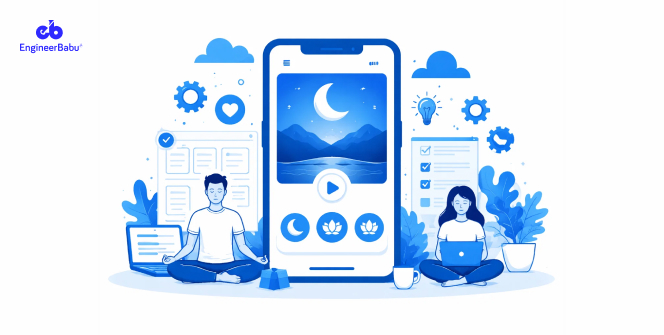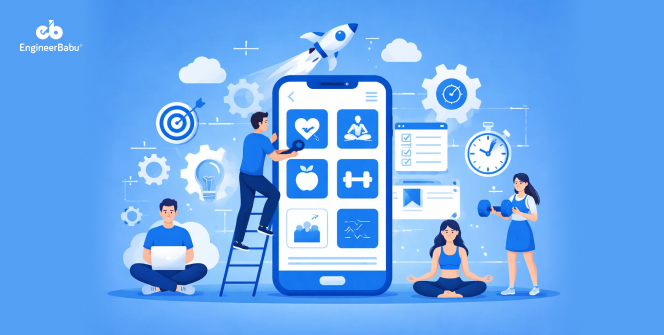Launching a healthcare app isn’t just about writing code — it’s about navigating one of the most heavily regulated, rapidly evolving industries in the world.
Whether you’re a startup looking to disrupt remote patient care, a hospital digitizing patient records, or a medical device company building a companion app, one wrong hire can derail your project, increase compliance risks, and damage your reputation.
According to McKinsey, the digital health market is projected to exceed $660 billion by 2025, but this growth comes with higher scrutiny from regulators and users alike. Today’s patients expect not just functionality, but HIPAA-compliant, interoperable, secure, and highly usable applications. Selecting the right tech stack is essential to ensure your AI-powered healthcare solution is scalable, secure, and compliant with industry regulations.
The integration of advanced technologies—especially artificial intelligence and AI-powered features—is transforming healthcare app development by enabling smarter diagnostics, patient engagement, and automation. Choosing the appropriate tech stack is crucial for building reliable, future-proof healthcare applications that can adapt to evolving requirements.
Choosing the right healthcare app development partner is no longer optional — it’s a critical investment.
Introduction to Healthcare App Development
Healthcare app development has become a cornerstone of digital transformation in the healthcare industry. As healthcare providers and healthcare organizations strive to deliver better patient care, the demand for innovative software solutions continues to rise. These applications are designed to streamline clinical workflows, support remote patient monitoring, and enable more personalized treatment plans—ultimately driving improvements in patient outcomes and patient satisfaction.
With the widespread adoption of mobile devices and the integration of advanced technologies, healthcare systems are leveraging custom apps to enhance operational efficiency and facilitate real-time communication between patients and healthcare professionals. From managing patient records and electronic health records to supporting telehealth platforms and remote monitoring, healthcare app development empowers organizations to respond to the evolving needs of both patients and clinicians.
By focusing on secure, user-friendly, and interoperable solutions, healthcare app development not only addresses regulatory requirements but also helps many healthcare providers deliver higher quality care, reduce unnecessary ER visits, and improve overall patient engagement. As the healthcare industry continues to evolve, investing in robust app development is essential for organizations aiming to stay competitive and deliver measurable improvements in patient care.
Questions You Must Ask Before Choosing a Healthcare App Development Company
Do You Have Proven Expertise in Healthcare App Development?
Healthcare app development isn’t the same as building a generic mobile app. You need a partner who understands:
- HIPAA (Health Insurance Portability and Accountability Act) compliance for U.S.-based apps.
- GDPR compliance if you handle EU citizens’ health data.
- HL7 and FHIR standards for healthcare interoperability.
- Integration with EHR/EMR systems like Epic, Cerner, or Allscripts, and experience working with hospital systems for seamless data exchange.
- Security concerns specific to PHI (Protected Health Information).
What to look for:
- Past projects specifically in healthcare, including healthcare AI solutions (not just “we can do healthcare too”).
- Experience collaborating with healthcare leaders to define project scope and ensure regulatory compliance.
- Understanding of clinical workflows, patient data flow, doctor-patient interactions.
- Deep understanding of the complexities of clinical practice and how apps are used in real-world healthcare settings.
- Experience building apps like telehealth platforms, remote monitoring tools, digital therapeutics, etc.
Pro Tip: Ask how they handled HIPAA risk assessments or audit readiness in previous projects.
How Will You Ensure Regulatory Compliance Throughout Development?
Why it matters:Missing compliance during development isn’t something you can “fix later.” You could face lawsuits, heavy fines, or product recalls. Your partner should demonstrate a clear compliance-first mindset, not treat it as an afterthought. Understanding the unique requirements of the US healthcare system, especially regarding HIPAA compliance, is essential for any AI-powered adherence companion operating in this environment.
What to look for:
- Use of Privacy by Design frameworks in their development process
- Early-stage compliance assessments (not just at launch)
- Familiarity with HIPAA Security Rule, Privacy Rule, and Breach Notification Rule
- Strategies for securing data at rest, in transit, and during processing
- Experience conducting regular Vulnerability Assessments and Penetration Testing (often required in healthcare settings)
- Implementation of audit logs to track user activity and maintain HIPAA compliance
- Robust access controls to ensure only authorized personnel can access sensitive data
Bonus tip:Ask whether they collaborate with external HIPAA compliance consultants or legal teams during design phases — that’s a green flag.
How Will You Address Patient Data Security and Patient Privacy?
Healthcare data breaches cost organizations an average of $10.93 million per incident in 2023. Security isn’t just good practice — it’s survival. Protecting sensitive medical data and ensuring ongoing data quality are essential for reliable healthcare outcomes, especially when developing AI-powered solutions.
What to look for:
- Full encryption for data in transit (using TLS 1.2+ or better) and at rest (AES-256 encryption standards).
- Implementation of Role-Based Access Control (RBAC) to minimize insider risks.
- Automatic session timeouts, biometric logins, multifactor authentication (MFA).
- Secure handling and storage of patient histories as part of a comprehensive data protection strategy.
- Clear plan for secure API management if integrating with third-party services.
- Regular internal and external security audits, not just one-off scans.
Pro Tip: Ask to review their Security Policy Document or Breach Response Plan (they should have one ready).
How Will You Handle Integration With Existing Healthcare Systems?
Healthcare apps rarely operate in a vacuum. Most need to integrate with existing EHRs, LIS, RIS, or Patient Management Systems to enable real-time data flow. Healthcare integration, including interoperability with standards like HL7 and FHIR, is essential for ensuring seamless workflows and effective adoption of AI-powered solutions in medical environments.
Seamless integrations are critical to improving workflows, avoiding data silos, and delivering real value to end-users.
What to look for:
- Proven experience with EHR platforms like Epic, Cerner, Athenahealth, or Meditech.
- Ability to work with HL7 (Health Level Seven) and FHIR (Fast Healthcare Interoperability Resources) standards.
- Understanding of API-based integrations vs. legacy system bridges.
- Secure handling of Authorization/Authentication using standards like OAuth 2.0.
- Hands-on knowledge about integration challenges — data mapping, synchronization, patient ID matching (Master Patient Index).
- Willingness and ability to collaborate closely with healthcare teams to ensure successful integration and adoption of the AI solution.
Pro Tip: Ask if they have built healthcare apps that passed real hospital integration tests or certifications.
What Development Process and Methodology Do You Follow?
A chaotic, disorganized development process will delay your app, introduce bugs, and lead to feature creep. In healthcare, iterative feedback loops and change management (especially after pilot testing) are essential. Additionally, ongoing support and regular updates are crucial for maintaining compliance, addressing user feedback, and ensuring the long-term success of your AI-powered adherence companion.
What to look for:
- Use of Agile methodology with defined sprints and sprint reviews.
- Clear visibility into project progress through Scrum meetings or Kanban boards.
- A dedicated Product Owner or Healthcare SME (Subject Matter Expert) involved in sprint planning.
- Alignment of the development process with your business objectives to ensure the solution meets your organizational goals.
- Documentation practices — User Stories, Acceptance Criteria, Traceability Matrices (critical for healthcare).
Bonus:Companies offering a Discovery Phase upfront (with wireframes, architecture plans) demonstrate maturity.
How Will You Prioritize User-Centric Design and Accessibility?
A healthcare app isn’t just for tech-savvy millennials. You must design for patients, physicians, nurses, and even elderly users — with varied tech literacy. It’s also crucial to consider patient demographics, as understanding the age, region, and specific needs of your target users helps tailor the app for better adoption and regulatory compliance.
Poor usability can cause clinical errors or non-adherence to treatments.
What to look for:
- Experience conducting User Research specifically in healthcare environments
- Building interfaces that comply with WCAG 2.1 accessibility standards.
- Identifying and prioritizing core features that enhance usability and accessibility for all user groups.
- Focus on Minimalist Design, intuitive navigation, readable fonts, and error-proof interactions.
- Prototyping and gathering feedback from real healthcare professionals during the build.
- UX focused on speed, clarity, and minimal cognitive load (especially in emergency care apps).
Pro Tip: Ask for examples where their design improvements directly increased user retention or clinical adoption rates.
What Testing and Quality Assurance (QA) Processes Are Followed?
In healthcare, bugs are not just annoying — they can be life-threatening. Rigorous testing is essential to ensure safety, reliability, and compliance with healthcare regulations.
Quality Assurance needs to cover functionality, compliance, security, performance, and user flows extensively.
What to look for:
- Separate, dedicated QA teams (not just developer-led testing).
- Unit Testing, Integration Testing, System Testing, and UAT (User Acceptance Testing).
- Compliance testing for HIPAA and GDPR.
- Real-device testing across iOS, Android, tablets, rugged hospital devices.
- Load testing, particularly if handling simultaneous doctor-patient sessions.
- Implementation of continuous monitoring to detect and address data or concept drift in AI models post-launch, ensuring ongoing model performance and triggering retraining when necessary.
Bonus: Check if they can simulate clinical environment scenarios for high-fidelity app testing.
What Post-Launch Support and Maintenance Services Are Offered?
Healthcare apps need constant updates — to fix bugs, patch security vulnerabilities, update APIs, and adapt to new regulations (e.g., changes in HIPAA Omnibus Rule).
Without post-launch support, your app can become obsolete fast.
What to look for:
- SLA (Service Level Agreement) for response and resolution times.
- Scheduled maintenance windows for critical patches.
- Real-time monitoring for uptime and errors (using tools like New Relic, Datadog).
- Version control for gradual updates without service disruption.
- Clear escalation paths for critical issues.
Pro Tip: Ask about annual compliance re-audits — a must in healthcare.
What Is the Estimated Timeline and Cost Structure?
Scope creep, unrealistic timelines, or hidden costs can destroy your healthcare project’s budget and timeline.
What to look for:
- A detailed breakdown of milestones, deliverables, and payment terms.
- Transparency about costs related to compliance, certifications (e.g., ISO 13485 if it’s a regulated device), or external audits.
- Time & Materials (T&M) vs. Fixed Price — know what fits your risk appetite.
- Cost planning for future feature rollouts, not just MVP launch.
- Consideration of mobile app development costs and strategic decisions, including platform support (iOS, Android, cross-platform) and whether to use in-house or outsourced teams.
Pro Tip: Get the cost estimate in writing, mapped clearly to deliverables and acceptance criteria.
How Is Intellectual Property (IP) Ownership Handled?
You must own your source code, designs, and documentation fully — otherwise, your healthcare app’s future can be held hostage.
What to look for:
- Clear contract clauses assigning all IP rights to your company.
- No hidden third-party licensing dependencies (unless explicitly agreed).
- Access to full repositories (GitHub, Bitbucket) post-project.
- Clarity on ownership of APIs, backend infrastructure, and user databases.
Can You Build Scalable Architecture for Future Growth?
Your healthcare app might start small but could later support thousands of concurrent users, multiple clinics, or even national health programs.
Scalability should be designed from Day 1, not “added later.”
What to look for:
- Look for a Microservices-based architecture if one of your goals is scaling.
- Cloud-native app strategies (AWS, Azure Healthcare cloud offerings).
- Load balancing, horizontal scaling, and database sharding capabilities.
- Modular codebases allowing feature expansions without rewrites.
- Selection and management of AI models that can scale and adapt as your app grows, ensuring ongoing performance, compliance, and personalization.
How Do You Keep Up With Emerging Healthcare Technologies?
Healthcare tech is constantly evolving — think AI diagnostics, blockchain for health records, remote patient monitoring via IoT. Your development partner must stay ahead or risk building obsolete apps.
What to look for:
- Ongoing R&D investment in AI, IoMT (Internet of Medical Things), Telehealth 2.0.
- Experience with machine learning for healthcare innovation and workflow automation.
- Use of AI tools for diagnostics, including clinical validation to ensure improved patient outcomes.
- Expertise in natural language processing to enable effective patient interaction through chatbots, virtual assistants, or voice-activated interfaces.
- Integration of predictive analytics for forecasting patient outcomes and supporting clinical decision-making.
- Attendance or participation in conferences like HIMSS, HLTH, or MedTech Innovation Expo.
- Thought leadership articles, webinars, or case studies proving their future readiness.
Why Should We Choose You Over Other Healthcare App Development Companies?
This is your final gut-check. A true expert partner should differentiate themselves without resorting to vague claims like “we care more.” When partnering with an experienced healthcare app development company, consider the key benefits such as improved patient outcomes, cost savings, and the ability to deliver scalable, AI-powered solutions that make a measurable impact for both providers and patients.
What to look for:
- Specific healthcare certifications (e.g., ISO 27001, HITRUST certification).
- Dedicated healthcare development teams, not generalized mobile teams.
- Published real-world success stories in peer-reviewed journals or clinical validations (ideal but rare), demonstrating the ability to handle complex medical tasks.
- Ability to strategically advise — not just “take orders”.
Conclusion
Choosing a healthcare app development company is a critical decision. It is not only about technical skills. The right partner must deeply understand healthcare regulations, patient privacy, and clinical data workflows. They should have proven experience with HIPAA, GDPR, and interoperability standards like HL7 and FHIR.
Security, compliance, and scalability must be part of the plan from the very beginning. A healthcare app must meet strict industry requirements while delivering a smooth, reliable experience for users. Taking the time to ask the right questions reduces risks and avoids costly mistakes. It also ensures you partner with a team that can support your growth in the long term. Your app’s success will depend on the foundation you build today.
FAQs
Why is healthcare app development different from regular app development?
Healthcare app development must comply with strict regulations like HIPAA, GDPR, and HL7 standards. It also requires a deep understanding of clinical workflows, data interoperability, patient confidentiality, and accessibility for a broad user base, from physicians to elderly patients. Additionally, it is essential to incorporate up-to-date clinical guidelines and ensure robust management of medical records and medical histories, as these are critical for accurate AI-powered decision-making and adherence to healthcare standards.
How important is HIPAA compliance for a healthcare mobile app?
HIPAA compliance is critical for any healthcare app dealing with Protected Health Information (PHI) in the U.S. Failure to comply can lead to heavy fines, legal consequences, and loss of patient trust. Ensuring HIPAA compliance must be built into the app from the earliest design stages.
What should be included in a healthcare app security strategy?
A robust healthcare app security strategy should include end-to-end encryption, multi-factor authentication, secure APIs, role-based access control, session timeout policies, and regular security audits. It should also have a breach response plan in place before launch.
How long does it typically take to build a custom healthcare app?
The development timeline for a healthcare app can vary widely based on complexity, integrations, and regulatory requirements. On average, an MVP healthcare app can take 4–8 months, while fully featured apps with complex integrations may take 9–15 months or more, including compliance audits.
How does EngineerBabu support healthcare startups with their healthtech app development?
EngineerBabu specializes in building secure, scalable, and compliant healthcare applications tailored for startups, hospitals, and medical device companies. Their healthtech team is experienced with HIPAA, GDPR, HL7, and FHIR standards, and offers end-to-end services — from product discovery and UX design to development, integration, and ongoing maintenance.
EngineerBabu supports medication adherence by integrating AI agents and wearable devices for remote patient monitoring, enabling real-time tracking of vital signs and timely interventions. Their AI systems facilitate early diagnosis and suggest personalized treatment options by analyzing comprehensive patient data, reducing the need for human intervention in routine tasks and enhancing care delivery. The team emphasizes improving patient outcomes through advanced AI-powered solutions that streamline clinical workflows and support continuous care. Additionally, EngineerBabu prioritizes robust data preparation processes to ensure AI models remain accurate, up-to-date, and compliant with evolving medical guidelines. They have successfully delivered projects across telemedicine, wearable tech, patient management, and digital therapeutics.



